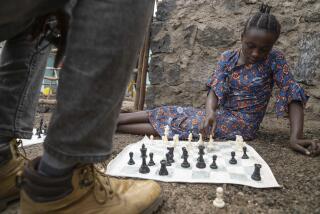Students Learn Value of Concentration : Chess Whiz Gives Moving Lesson
- Share via
After losing a chess game to international grandmaster Lev Alburt, Buena Park Junior High School student Daniel Yoo, 13, glanced quickly at the chess champion, who had just played 20 simultaneous games with students Monday morning and won all of them.
“I guess I’ve got a lot to learn before I can be like him,” Yoo said with a shrug, admitting that he had been a bit nervous playing Alburt, 41, a two-time U.S. chess champion since his defection from the Soviet Union in 1979.
Twenty seventh- and eighth-graders, all members of the school’s chess club, faced Alburt in a showdown that featured the champion running from game to game and making moves without hesitation.
Alburt showed no mercy, demolishing the young players within two hours, while at the same time dispensing advice and encouragement.
“I played my best,” Alburt said, smiling slightly. “I had to show them a real challenge so they have things to look forward to.”
Blake Tatsuta, 13, agreed that the champion didn’t slack off for them.
“I got a headache from playing that game,” said Tatsuta, who held his own long enough to be the next-to-last player against Alburt. “I was just hoping that he would make a mistake. But he didn’t,” the young player said.
Alburt was invited to challenge the students as a kickoff for the school’s chess season, club adviser Dewain R. Barber said. The school will participate in the National Junior High Chess Championships, which are being sponsored by the City of Buena Park in early May.
Alburt, noting that chess has not been as widely played in the United States as it has in the Soviet Union and European countries, said it could be just as popular here if children learn to play at an early age.
“I don’t want everybody to be a professional chess player. But with chess, you learn many skills that could be applied in other things, like school,” Alburt said, citing math and English as examples where the concentration skills developed in chess can be used.
The U.S. Chess Federation has been working to stimulate interest in the game among children and adults for years, said Gerard Dullea, executive director of the federation.
“We’re trying to make more people aware of the game as a cultural game, like baseball or football,” Dullea said. “It just takes time for people to learn the rules.”
Playing chess teaches students concentration skills that can be used in class, and at the same time it is fun, said Alburt, who learned the game at the age of 5 while he was growing up in Odessa.
Yoo, the last survivor in the 20-game showdown, said chess forces him to concentrate on strategies to win.
“It’s sort of like a war,” said Yoo, who learned to play at the age of 9. “You got to work hard and think a lot. But it’s more civil.”
Alburt was declared an international grandmaster in 1978 by the World Chess Federation. About 250 chess players are similarly ranked, second only to the current world champion, Gary Kasparov of the Soviet Union.
Alburt, now a U.S. citizen, sought political asylum in 1979 when he was scheduled to play in the European Cup Tournament in West Germany.
“In the Soviet Union, I was considered the John McEnroe of chess as far as high ranking,” Alburt said. “But despite my economical privileges. I found it morally unpleasant . . . anti-human. I wanted to be a free man because I felt like a slave to the state.”
More to Read
Get our high school sports newsletter
Prep Rally is devoted to the SoCal high school sports experience, bringing you scores, stories and a behind-the-scenes look at what makes prep sports so popular.
You may occasionally receive promotional content from the Los Angeles Times.






